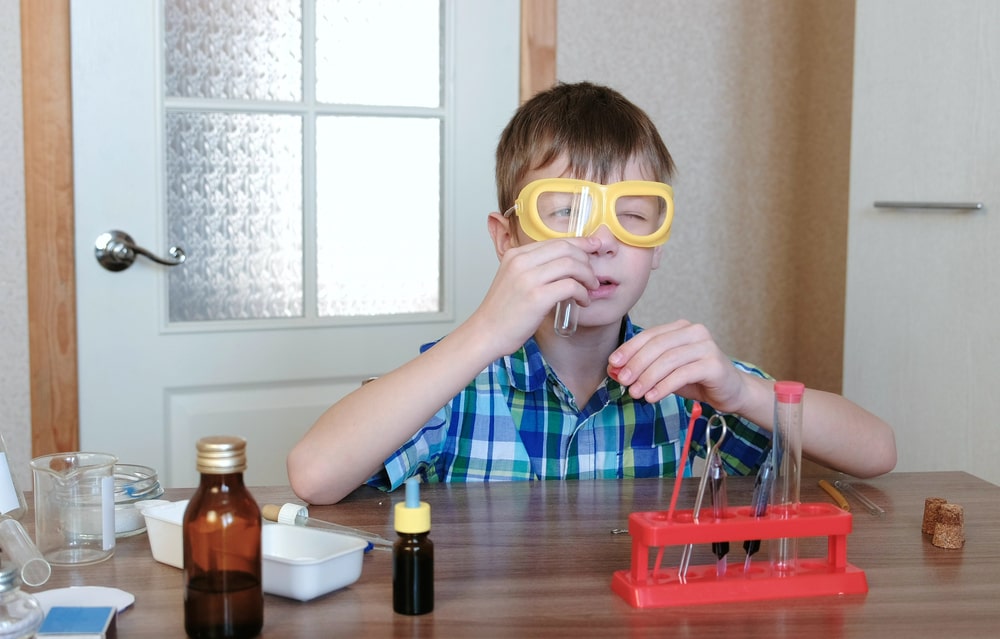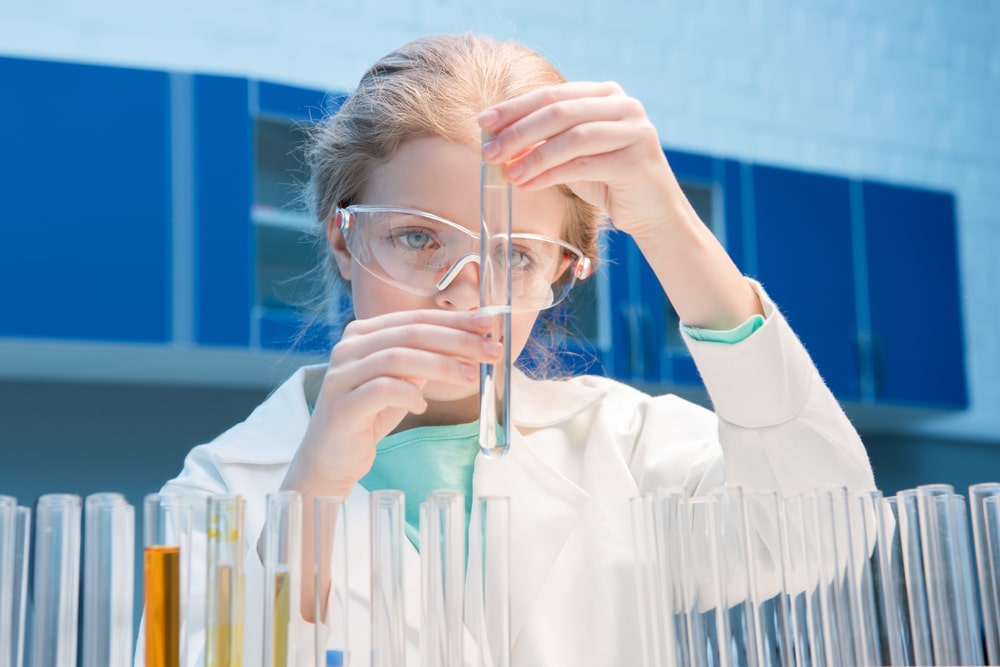Are you a science nerd? Do you love all things chemistry-related? Then a chemistry-inspired baby name may be perfect for you. The names on our list come from famous chemists, the names of elements, and some other geeky sources.
Whether you are looking for a subtly homage to your favorite chemistry whizz or are looking for something a little more obviously chemistry-related, we definitely have all those covered.
Baby Boy Names Inspired By Chemistry
Adair – This uncommon name of English origin is made from the words meaning wealth and spear. Adair Crawford was a chemist and physician who pioneered methods for measuring heat capacity and he also discovered strontium.
Albertus – The name means noble and bright. Albertus Magnus was a German mathematician in the 12th century who discovered arsenic.
Alexander – A name of Greek origin and means defender of the people. Alexander Fleming was a biologist and botanist, he was famous for his discovery of benzylpenicillin.
Alfred – Of English origin and means elf ruler or counselor. Alfred Nobel was a Swedish chemist who invited dynamite and was also the founder of the Nobel Prize organization. Alfred Werner was a Swiss chemist who founded coordination chemistry.
Amedeo – Italian form of the name Amadeus and means love of God. Amedeo Avogadro was an Italian scientist who discovered atomic molecular theory and formulated Avogadro’s Law.
Anders – Means son of Andrew and is of English origin. Anders Angstrom was a famous physicist who was one of the founders of spectroscopy.
Andreas – Greek in origin and means manly. Spanish-Mexican chemist and naturalist Andres Manuel del Rio discovered vanadium.
Antoine – A name of Spanish origin but of unknown meaning. Antoine Lavisier was a French chemist who was known as the father of modern chemistry. He named both oxygen and hydrogen.
View in gallery
Argon – Argon is a colorless and odorless gas. The name is derived from a Greek word meaning lazy or inactive, as a reference to the fact that the gas undergoes almost no chemical reactions.
Aston – English in origin and means noble stone. Francis Aston was a British scientist famous for developing the mass spectrograph and discovering 212 naturally occurring isotopes.
Axel – A name of Scandinavian origin and means my father is peace. Baron Axel Cronstedt, a chemist discovered nickel and then went on to devise a system for categorizing minerals based on their chemistry.
Bernard – French in origin and means bold as a bear. Bernard Courtois, a French chemist who discovered the element iodine and isolated morphine.
Boris – Means fight or fighter in Russian. The name is inspired by Boron, an element produced entirely by cosmic ray spallation and supernova. It is a low abundance element in the solar system and in the Earth’s crust.
Burke – Of English origin and means from the fortress. Element 97, berkelium was named for Berkely, California – where it was discovered at the Lawrence-Berkeley National Lab.
Cal – Inspired by calcium, also means bald.
Carl – A name of German origin and means manly. Carl Gauss was a famous German mathematician.
Chaim – Hebrew in origin and means life. Chaim Weizmann was a British chemist who developed industrial fermentation.
Clarence – Means British title and is of English origin. Clarence Birdseye was the founder of the technique for freezing food and his name is still seen on one of the major brands.
Clemens – Of Latin origin and means mercy. Clemens Winkler a German chemist who discovered the element germanium.
Cobalt – This element is only found in the Earth’s crust in a chemically combined form. It was also the first metal to be discovered since the prehistorical period.
Cole – Inspired by carbon, which means coal. The name Cole means people’s victory in Greek.
Cyprus – English in origin and is a type of tree. The city of Cyprus produced a lot of copper, giving this metal its name.
View in gallery
Dalton – Means from the valley town and is of English origin. John Dalton was a chemist who identified and presented atomic theory.
Dmitriy – The name is of Russian origin and means fruit of the earth. Dmitriy Mendeleev was a Russian chemist who devised the periodic table of elements.
Edison – A name of English origin and means son of Edward. Thomas Edison conducted chemistry experiments aboard a train as time allowed during his job as a telegraph operator.
Eduard – This name is a variation of Edward and means rich guard. Eduard Buchner was a German chemist known for his work with enzymes that revolutionized biochemistry.
Edwin – English in origin and means rich or prosperous friend. American biochemist Edwin Krebs was known for his work with enzymes and proteins.
Elion – The name is of unknown meaning. Gertrude Elion was an American biochemist famous for developing new drugs to treat diseases such as leukemia, autoimmune disorders, and malaria.
Ernest – Means earnest and is of English origin. Ernest Rutherford won the Nobel Prize for Chemistry in 1908 for his investigations into radioactive substances.
Ernst – This is the European form of Ernest and means serious. Richard Ernst a Swiss chemist who developed high resolution nuclear magnetic resonance spectroscopy (NMR). This then led to the development of MRI and its use in medical diagnostics.
Fleming – French in origin and means a Flemish person or from Flanders, Belgium. Alexander Fleming was a botanist and biologist, famous for his discovery of benzylpenicillin.
Flint – A name of English origin and means flint rock. The name was often given to someone who lived near flint. Silicon gets its name from the Latin word silex which also means flint.
Francis – Means from France or free and is of Latin origin. Francis Aston was a British scientist famous for developing the mass spectrograph and discovering 212 naturally occurring isotopes. Francis Bacon was an English philosopher who developed the scientific method. And finally, there is Francis Crick a British biologist who discovered the double helix structure of DNA.
View in gallery
Franklin – Means free man and is of English origin. Rosalind Franklin a chemist famous for her research in the molecular structure of DNA.
Frederick – English in origin and means peaceful ruler. Frederick Sanger, two time Nobel Prize-winning chemist. He is famous for determining the base sequences of DNA.
Fritz – Of German origin and means peace ruler. There are several famous Fritzes in chemistry, such as Fritz Haber a German chemist who synthesized ammonia, discovered calcium, sodium, potassium, and boron. Fritz Lippman a German-American biochemist who co-discovered coenzyme A.
Gerhard – A name of German origin and means brave spearman. Gerhard Herzberg was a German-born Canadian physicist who was known for pioneering molecular spectroscopy.
Giulio – Italian in origin and means youthful, downy and is the Italian form of Julius. Giulio Natta an Italian chemist who was known for his work on polymers.
Glenn – Means from the wooded valley and is of Scottish origin. Glenn Seaborg is an American nuclear chemist and is the namesake of the radioactive element Seaborgium. He also discovered ten transuranium elements, earning him a Nobel Prize in chemistry.
Graham – A name of English origin and means from the gravelly homestead. Thomas Graham was a chemist famous for his work on the diffusion of gases, which later became known as Graham’s Law.
Haber – The name was given to people who grew or sold oats. Fritz Haber was a German chemist who worked on synthesizing ammonia and also discovered calcium, sodium, potassium, and boron.
Henning – It comes from Heimrich and means home ruler. Henning Brand was a German alchemist who discovered phosphorus in 1669 while trying to create the philosopher’s stone of legend.
Henry – German in origin and means ruler of the home. Sir Henry Roscoe was a British chemist who was famous for his isolation of the element vanadium.
Hume – A name of English origin and means from the river island. Wallace Hume Carothers was an American chemist who invented nylon and neoprene rubber.
View in gallery
Irving – English in origin and means from Irving, Scotland. Irving Langmuir was an American chemist and physicist and was also a winner of the 1932 Nobel Prize for his work in surface chemistry.
Isaac – why not name your little boy after one of the most famous scientists Isaac Newton. He made significant advances not only in chemistry but also in mathematics, astronomy, and physics. The name Isaac comes from the Hebrew word Yitzchaq, which means laughter.
James – James Watt was the inventor of the steam engine, which was critical during the industrial revolution. His condensing chamber improved the efficiency of steam. James is a Hebrew name and means supplanter.
Jens – Scandanavian in origin and means God is gracious. Jens Skou is a Danish biochemist who is known for his research in enzymes including the ion pumps that control muscle contractions.
Johan – Of German origin and means God is gracious. Johan Arfwedson a Swedish chemist who was the first person to discover the element lithium.
John – A name of Hebrew origin and means God is gracious. John Dalton was a chemist famous for identifying and presenting the atomic theory.
Jonas – Of Hebrew origin and means a dove. Anders Jonas Angstrom was one of the founders of spectroscopy.
Lawrence – English in origin and means laurel. Ernest Lawrence invented the cyclotron and the element lawrencium was named after him. The cyclotron was a device used to isolate many radioactive elements.
Leo – Means lion and is of Italian origin. Leo Baekeland was a Belgian-American chemist who invented photographic paper and the plastic Bakelite.
Linus – A name of Greek origin and means flax colored. Linus Pauling was an American chemist and a founder of quantum chemistry.
Louis – German in origin and means famed warrior. Louis Pasteur was a French chemist known for discoveries related to tartaric acid, chiral molecules, and crystallography.
Magnus – Inspired by the element magnesium, a shiny solid which is found in the universe as well as in the Earth’s crust. Magnus means great in Danish, fighter in Norse, and strong warrior in Swedish.
View in gallery
Mario – Of Italian origin and means warlike. Another Nobel Prize-winning chemist, Mario Molina, co-discovered the hole in the ozone layer.
Martin – Latin in origin and means servant of mars or God of war. Martin Klaproth was a German chemist who proposed the existence of the element potassium.
Michael – Means who is like God? Is of Hebrew origin. Michael Faraday was a chemist famous for his contributions to electrochemistry and electromagnetism.
Neo – The name is inspired by the noble gas neon, which is around two-thirds the density of air.
Nernst – This name is of unknown meaning. Walter Nernst was a German chemist famous for his contributions to thermochemistry and developing the Nernst Equation.
Newton – A name of English origin and means from the new town. Sir Isaac Newton was not only an astronomer but he also spent significant time researching alchemy.
Nick – Inspired by the metal nickel that has a slight golden tinge to it. Nick means people’s victory and is of Greek origin.
Odd – The name means the point of the sword. Odd Hassel was a Norwegian chemist who is famous for his study of the three-dimensional geometric structure of molecules.
Osamu – Japanese in origin and means discipline or study. Osamu Shimomura won the Nobel Prize in 2008 for his discovery of green fluorescent protein (GFP) which decades later biomedical researchers began to monitor the workings of proteins in living tissue and to confirm the insertion of genes.
Otto – German in origin and means wealth. Otto Hahn was a German chemist and is often referred to as the father of nuclear chemistry.
Prafulla – The name has no known meaning. Sir Prafulla Chandra Ray was an Indian scientist, who was known as the father of the Indian chemical industry for his work on mercurous nitrate and ammonium/alkylammonium nitrites.
View in gallery
Richard – English in origin and means brave ruler. Richard Ernst is a Swiss chemist who is known for his developments of high resolution nuclear magnetic resonance spectroscopy (NMR) which then led to the further development of MRS in medical diagnostics.
Roald – Of English origin and means counsel rule. American chemist Roald Hoffman is known for his work and theories regarding chemical reactions and quantum mechanics.
Robert – A name of English origin and means bright fame. Robert Boyle was famous for being one of the first people to apply the scientific method to chemistry and physics.
Roger – Of English origin and means famous spear. Roger Tsien won the Nobel prize in Chemistry in 2008 for his partin the discovery of green fluorescent protein (GFP).
Rutherford – English in origin and means from the cattle ford. Ernest Rutherford is considered the father of nuclear physics due to his understanding of radioactive half-life and the discovery of radon.
Shanti – Means peace and calm and is of Indian origin. Shanti Bhatnagar was the father of research laboratories. He used colloidal chemistry to improve procedures for drilling crude oil.
Svante – A name of Scandanavian origin and means holy. Svante Arrhenius was famous for developing the Arrhenius equation, which calculates chemical reaction rates.
Tadeusz – The name means heart or gift of God. Tadeusz Reichstein was a Swiss chemist who discovered the hormones of the adrenal cortex, which led to the isolation of cortisone for the treatment of arthritis.
Thomas – A name Greek in origin and means a twin. Thomas C. Schelling won a Nobel prize in 2005 based on game theory that led to his work on nuclear strategy.
Thor – The element thorium was discovered and Swedish chemists named it after Thor, the Norse god of thunder.
Torbern – Swedish chemist Torbern Bergman was famous for publishing an extensive chemical affinity table.
Vannoccio – Italian metallurgist Vannoccio Biringuccio is known as the father of the foundry industry and his precise documentation of mining and refining metals in the 1500s.
View in gallery
Vasili – A name of Greek origin and means kingly. Russian mining engineer Vasili Samarsky-Bykhovets is the namesake of the element samarium.
Wallace – Of English origin and means foreigner or stranger. Wallace Hume Carothers was an American chemist who was famous for inventing nylon and neoprene rubber.
Walther – The name means ruler of the army. Walther Nernst was a German chemist famous for his contributions to thermochemistry and developing the Nernst Equation.
Wilhelm – German in origin and means with gilded helmet. Wilhelm Roentgen discovered and reproduced x-rays. The element roentgenium was also named after him.
William – A name of English origin and means with gilded helmet. William Zeise was a Danish chemist who synthesized the first organometallic compound.
Wolfram – Tungsten which is element 74 on the periodic table uses the symbol W for wolfram.
Yuri – Russian in origin and means farmer. Yuri Oganessian led the discovery of superheavy elements. The element organesson is named after him.
Yves – Means yew and is of French origin. Yves Chauvin was known for his work for deciphering the process of olefin metatheses for which he won a Nobel Prize in 2005.
Zeise – Danish chemist William Zeise was famous for synthesizing the first organometallic compound.
Zinc – An element on the periodic table. This name offers cool possibilities for your little boy.
Baby Girl Names Inspired By Chemistry
Ada – Of German origin and means noble, happy. Ada Lovelace was the daughter of the English poet Lord Byron. She was a mathematician and metaphysician.
Agnes – Means pure or chaste and is of Greek origin. Agnes Robertson was the first woman botanist who became a fellow of the Royal Society.
Alice – A name of English origin and means from nobility. Alice Hamilton studied occupational illnesses and the effects of chemical compounds and industrial metals on the human body. She was also the first woman to be appointed as a faculty at Harvard University.
View in gallery
Allene – Means little rock and is of American origin. Allene Jeanes was a chemical researcher who developed Dextran, an important replacement for blood plasma during the Korean war.
Andromeda – Of Greek origin and means ruler of men. Andromeda is a galaxy named after a Greek princess who became a star.
Anna – A name of Hebrew origin and means gracious, merciful. Anna Sundström was the first female Swedish chemist. The Swedish Chemical Society awards the author of the best Swedish Ph.D. defense in organic chemistry with the Anna Sundström Award in honor of her.
Asima – Asima means one who exceeds. It seems fitting for the woman who went on to develop anti-epileptic drugs and anti-malaria drugs – Asima Chatterjee, an Indian organic chemist.
Astrid – Scandanavian in origin and means God’s strength. Astrid von Euler was a chemist and geologist. She was the first woman in Sweden to obtain a doctoral degree in science.
Aurora – The name of the beautiful natural light display, Aurora Borealis or northern lights. The name has consistently been on the popular name list since the 19th century.
Aurum – Means glowing dawn and is of Latin origin. It is also the Latin name for gold and was the first metal used by humans as early as 40,000 BC.
Beryl – Inspired by the rare element of Berylium. It will also remind you of a gemstone of varying colors, but often yellow-green.
Cadmia – The element cadmium gets its name from Cadmus, the ancient founder of Thebes. Another chemical name from Greek mythology.
Caroline – Latin in origin and means free or beautiful woman. Caroline Herschel was a German astronomer. She was the first woman to discover eight comets in her lifetime and was also the first woman to have her work published by the Royal Society.
Chlorine – A yellow-green gas at room temperature. It is an extremely reactive element and a strong oxidizing agent.
Cinna – The red mineral called cinnabar is where Mercury comes from.
View in gallery
Clara – Means illustrious and is of Latin origin. Clara Immerwahr was a pacifist and women’s rights activist. She was the first German woman to receive a doctorate in chemistry. She was also married to chemist Fritz Haber.
Dorothy – A name of Greek origin and means gift of God. Dorothy Hodgkin was a British biochemist who was famous for her work on the structure of penicillin, insulin, and vitamin B12.
Edith – Means rich war and is of English origin. Edith Humphrey was an inorganic chemist and was a pioneer in the field of coordination chemistry. She was also the first British woman to receive a doctorate in chemistry.
Ellen – Greek in origin and means light. Ellen Richards was the founder of the home economics movement. She applied chemistry to the home and the study of nutrition. Ellen was also the first female graduate from MIT and its first female instructor.
Fluor – Inspired by fluorine. The name is derived from the Latin fluere which means to flow.
Francis – A name of Latin origin and means from France or free. Fanny Hitchcock had a doctorate in chemistry and then went on to devote her life to helping other women receive a university education.
Freya – Scandanavian in origin and means goddess of love, fertility, and beauty. The element vanadium gets its name from the Scandinavian goddess of beauty, Vanadis also known as Freya.
Galena – A name of Greek origin and means calm. Galena is also an important mineral source of the metal silver.
Gertrude – Dutch in origin and means spear of strength. Gertrude Elion was an American biochemist and developed new drugs to treat leukemia, autoimmune disorders, and malaria.
Giuliana – Means youthful, downy, and is of Italian origin. Dr. Giuliana Tesoran was an organic chemist who patented over 125 inventions. One of the most well known ones is flame-retardant fibers.
Hafnia – Element number 72, Hafnium, is named for the Latin name for the city of Copenhagen.
Helia – Helia means of the sun in Greek. It is also a name inspired by the noble gas helium.
Henrietta – A name of English origin and means ruler of the home. Henrietta was the name of an American astronomer who discovered the relationship between luminosity and the period of the stars.
Hessia – The element Hassium is named after the German town where it was discovered, Hassia.
View in gallery
Icie – A diminutive form of Bernice and means bringing victory. Icie Hoobler was an American biochemist who researched nutrition in mothers and children. Under her direction, the University of California published 300 journal articles and books on topics ranging from red blood cell chemistry to women’s metabolism.
Ida – German in origin and means hardworking. Ida Noddack was a German chemist who was the first person to mention the concept of nuclear fission. Along with her husband Walter Noddack and Otto Berg she discovered the element rhenium.
Ira – A short and sweet name inspired by iron.
Irene – Of Greek origin and means peace. Irene Joliot-Curie was a French chemist who received the Nobel Prize in chemistry in recognition of the synthesis of new radioactive elements.
Iris – Means colorful, rainbow, and is of Greek origin. The Greek goddess inspired the name of iridium.
Julia – A name of Latin origin and means youthful, downy. Julia Lermontova was the first female Russian doctor of chemistry.
Kali – Indian in origin and means a maiden, a bud. The element potassium uses the letter K for its symbol, it comes from the Latin kalium, which means plant ash.
Laura – Means laurel and is of Latin origin. American chemist Laura Linton discovered a mineral from the shores of Lake Superior that was later named after her – lintonite. Linton taught dietary principles and established an occupational therapy program for mentally ill women.
Lise – A name of German origin and means God is my oath. Lise Meitner worked in the fields of radioactivity and nuclear physics. The element Meitnerium was named after her.
Lovisa – Scandanavian in origin and means battle noise. Lovisa Hammarström was a Swedish chemist and was the first formally trained and educated female chemist.
Madeline – Means woman of Magdala and is of English origin. Madeleine Jouille was an organic chemist and served as an affirmative action officer at the University of Pennsylvania. She devoted her career to teaching and mentoring undergraduate and graduate students.
Marie – Of French origin and means of the sea or bitter. One of the most famous Maries in chemistry is of course Marie Curie who was famous for discovering radium and polonium.
View in gallery
Margaret – A name of English origin and means pearl. Margaret Huggins was an Irish astronomer, who, along with her husband William Huggins discovered spectroscopy. They even found a spectroscopic phenomenon known as Doppler shift, used to gauge the motion of stars.
Muriel – Irish in origin and means sea bright. Muriel Onslow was a biochemist who studied the inheritance of flower color in snapdragons and how the flower synthesizes the color. She was also one of the first female lecturers at Harvard.
Nadina – The name means hope. Nadezhda Ziber-Shumova, who was also known as Nadina, co-founded the Imperial Institute of Experimental Medicine in St Petersburg.
Nicole – Means victory of the people and is of French origin. The name is also inspired by the metal nickel.
Niobe – The element niobium gets its name from Niobe from Greek mythology. Niobe was the daughter of Tantalus, who is the namesake of the element tantalum. Niobium is right above tantalum on the periodic table.
Nova – The term is used to describe the explosion in a white drawn, that causes a sudden increase in the star’s brightness and then fades. Nova means new star and has enjoyed some popularity in the 20th century.
Odette – A name of French origin and means wealth. Odette Shotwell, Ph.D. discovered two antibiotics and patented three inventions. She also fought for equality for colored people, women, and the disabled in the sciences.
Odile – Of French origin and means rich, wealthy. Odile Eisenstein was a theoretical chemist who specialized in modeling the structure and reactivity of rare elements.
Rachel – Hebrew in origin and means ewe. Rachel Lloyd was an American chemist best known for her work on the chemistry and agriculture of sugar beets. She was also the first American woman to receive a doctorate in chemistry.
Rosalind – English in origin and means pretty rose. Rosalind Elsie Franklin was an English chemist and X-ray crystallographic who contributed to the understanding of DNA.
Ruby – You may have thought that this was inspired by the gemstone, but it is actually the soft, silvery-white metallic rubidium.
Samar – The Arabic meaning of Samar is conversations at night. Samar is also inspired by the hard silvery metal Samarium which oxidizes in the air.
Selenia – The nonmetal Selenium was the inspiration for this name. You could always opt for the more mainstream Selena which means moon goddess in Greek.
View in gallery
Stephanie – A name of French origin and means crown. American chemist Stephanie Kwolek, whose research led to the development of Kevlar, which is a synthetic fiber known for its extensive use in bulletproof vests.
Sybil – Of Greek origin and means prophets. Sibyl Rock was key in advancing mass spectrometry by developing advanced mathematics and an analog computer.
Thalia – Greek in origin and means to blossom or flourish. The chemical thallium gets its name from thallos, the Greek word for a green shoot or twig. The name originates from the green spectral line thallium produces.
Vana – Inspired by the hard, silvery-grey transition metal vanadium. This is a very rare chemical element in nature.
Vera – A name of Russian origin and means faith. Vera Popova was the first Russian woman to author a textbook. She also wrote about beekeeping, translated short stories from French, and published short stories she had written herself.
Violet – English in origin and means purple/blue flower. Iodine forms a purple metal, liquid, or gas when it can be isolated. It also takes its name from the Greek word for violet.
Yvonne – Of French origin and means yew. Yvonne Martin a cheminformatics expert who uses computers to develop therapeutic drugs.
The Final Thought
Not only has chemistry provided leaps in science that have hugely benefitted mankind but it has also provided us with some great inspiration for baby names.
Our list contains some very traditional names for both boys and girls, it also contains some truly unique and rare names that will sure to be a favorite amongst some parents.






